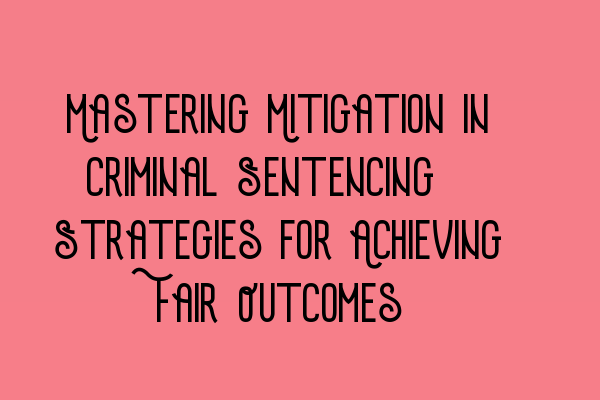Mastering Mitigation in Criminal Sentencing: Strategies for Achieving Fair Outcomes
When it comes to criminal sentencing, the goal is not only to deliver justice but also to achieve fair outcomes for all parties involved. One crucial aspect of this process is mitigation, which can significantly impact the severity of penalties imposed on defendants. In this article, we will explore the strategies for mastering mitigation in criminal sentencing, ensuring that solicitors are equipped with the necessary skills to advocate for their clients effectively.
Understanding Mitigation
Mitigation refers to the process of presenting evidence and arguments that could potentially reduce the severity of a sentence. It allows solicitors to provide the court with a comprehensive understanding of their clients’ circumstances, highlighting any mitigating factors that may warrant leniency.
One essential strategy in mastering mitigation is to thoroughly investigate and gather relevant evidence. This includes conducting interviews, reviewing personal history records, speaking to character witnesses, and exploring any potential mental health or psychological issues that may affect the client’s behavior. By presenting a compelling case for mitigation, solicitors can help secure fair outcomes for their clients.
Developing a Mitigation Strategy
Creating a strong mitigation strategy requires careful planning and preparation. Solicitors should collaborate closely with their clients to gather as much information as possible regarding their personal circumstances, background, and any contributing factors that may have led to the commission of the offense.
One effective approach is to present a mitigation package that includes letters of support from employers, family members, or community organizations. These testimonies can provide valuable insight into the defendant’s character, rehabilitation efforts, and potential for reintegration into society. By highlighting positive aspects of the client’s life, solicitors can demonstrate to the court that their client is capable of change.
It is also essential to consider any relevant case law or precedents that align with the client’s circumstances. Drawing parallels between past cases and the current one can help strengthen the argument for mitigation and provide a basis for a fair outcome. Staying up-to-date with legal developments and decisions is crucial for successful mitigation strategies.
Presenting Mitigation in Court
Mitigation is most effective when presented coherently and persuasively in court. Solicitors should aim to engage the judge through clear and concise arguments, focusing on the key points that support the mitigation case.
One useful tip is to highlight any efforts made by the defendant to take responsibility for their actions. Demonstrating remorse, cooperation with authorities, and steps taken towards rehabilitation can significantly impact the court’s perception of the defendant’s character. By emphasizing the client’s commitment to change, solicitors can advocate for fairer outcomes.
Furthermore, it is important to integrate the expert testimonies in the court proceedings. Expert witnesses can provide specialized knowledge and insights into the defendant’s mental state, substance abuse issues, or other factors that contribute to the offense. Utilizing expert testimonies strengthens the mitigation case, bringing further credibility to the arguments presented.
Conclusion
Mastering mitigation in criminal sentencing is crucial for solicitors aiming to achieve fair outcomes for their clients. By developing a comprehensive mitigation strategy, gathering relevant evidence, and presenting the case effectively in court, solicitors can advocate for leniency and highlight their clients’ potential for rehabilitation.
At SQE Criminal Law & Practice Law UK, we believe in equipping aspiring solicitors with the necessary knowledge and skills to excel in their legal careers. To learn more about essential study materials for the SQE exam or the importance of expert testimonies in building strong cases, check out these related articles:
- SQE Exam Prep: Essential Study Materials for Aspiring Solicitors
- Expert Testimonies in UK Courts: Building Strong Cases
- Demystifying the Solicitors Qualifying Examination Format
- SQE Exam for International Lawyers: Challenges and Success Strategies
- LLC Formation Made Simple: Step-by-Step Guide for UK Entrepreneurs
Remember, mastering mitigation is an essential skill for solicitors to ensure fair outcomes in criminal sentencing. By employing effective strategies and staying informed about legal developments, you can advocate for your clients and contribute to the pursuit of justice.
